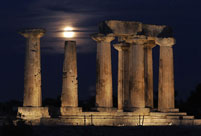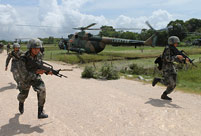 Interpreting the eight issues of the G20 summit
Interpreting the eight issues of the G20 summit
 Wild golden monkeys live at Qinling Mountains in NW China
Wild golden monkeys live at Qinling Mountains in NW China
 President Xi visits four central Asian nations and attend G20, SCO summits
President Xi visits four central Asian nations and attend G20, SCO summits
 Tibetan ethnic costumes presented during tourism festival in NW China
Tibetan ethnic costumes presented during tourism festival in NW China
 Military plane crashes in NE China
Military plane crashes in NE China
 Summer jobs: A or B
Summer jobs: A or B
 Vintage cars exhibited at auto cultural festival in China's Shanxi
Vintage cars exhibited at auto cultural festival in China's Shanxi
 Reading by the tongue
Reading by the tongue
 Those embarrassing copycat buildings
Those embarrassing copycat buildings
UNITED NATIONS/DAMASCUS, Aug. 28 -- As UN inspectors visited several locations in their second-day on-site probe, Syria asked the chemical weapons experts Wednesday to investigate three alleged chemical attacks carried out by rebels in the Damascus suburbs last week.
Bashar Ja'afari, Syria's permanent representative to the United Nations, had, on behalf of the Syrian government, sent a letter to "both the secretary-general of the United Nations as well as to the president of the Security Council."
"The letter contains a request by the Syrian government to the secretary-general to mandate immediately the investigation team present now in Damascus to investigate three heinous incidents that took place in the countryside of Damascus on Aug. 22, 24 and 25," Ja'afari said.
The envoy noted that members of the Syrian army inhaled poison gas as a result of the use by "terrorist groups" of chemical agents similar to the nerve gas sarin.
U.S. media have reported that the military strikes under consideration will hit targets inside Syria, involving sea-launched cruise missiles or possibly long-range bombers.
Administration officials said the options are not aimed at toppling the Syrian government led by President Bashar al-Assad, but rather a direct response to the use of sarin gas last week.
But U.S. President Barack Obama said Wednesday that he has not made a decision about how to respond to the alleged use of chemical weapons in Syria's internal conflict.
In an interview with the "PBS News Hour" at the White House, Obama said that he is weighing options in the wake of the claimed chemical attack in the suburbs of Damascus on Aug. 21, in which, as many as 1,300 people were reportedly killed.
He said the international norm against the use of banned weapons needs to be "kept in place."
The possible U.S.-led military attack on Syria drew mixed reactions from the international community.
In London, a British government motion published on Wednesday suggests the country may not take military action against Syria until the United Nations completes its investigation on the alleged use of chemical weapons.
The motion said that "every effort should be made to secure a Security Council Resolution backing military action before any such action is taken."
"The United Nations Secretary-General should ensure a briefing to the United Nations Security Council immediately upon the completion of the team's initial mission," it said.
In Ottawa, Canadian Foreign Minister John Baird said Wednesday it is unclear yet how Canada could contribute to a possible military intervention of Syria and he questioned the country's military capability.
The minister said that while keeping close contact with its allies and reviewing a full-range of options going forward, Ottawa will let decisions be made before it knows whether it has even the capacity to contribute militarily.
In Paris, French Minister Alain Vidal said Wednesday that the parliament will convene an emergency conference next Wednesday to discuss crisis in Syria.
French government spokeswomen Najat Belkacem-Vallaud also confirmed that President Francois Hollande has decided to "summon parliament on Wednesday to assess the situation in Syria."
In Brussels, Belgian Deputy Prime Minister and Foreign Minister Didier Reynders said Wednesday that evidence was needed before use of force, and Belgium trust in UN experts now working in Syria to check on the alleged use of chemical weapon by its government.
In the Hague, Dutch Foreign Minister Frans Timmermans said Wednesday he was awaiting the outcome of the UN report on the alleged use of chemical weapons in Syria before deciding on whether to support any military intervention.
Timmermans added that if the use of chemical weapons was proven, the Dutch were in favor of measures against the perpetrators.
In Moscow, Russian Deputy Foreign Minister Vladimir Titov said that it was untimely to talk about potential UN sanctions against Damascus before investigators submit a report on alleged use of chemical weapons in Syria.
Moscow has repeatedly admonished against possible military intervention in the Syrian crisis, stressing that such attempts would undermine efforts for a political settlement.
In Tehran, Iran's Supreme Leader Ayatollah Ali Khamenei warned Wednesday that the U.S. intervention in Syria will be a "catastrophe" for the region.
The region is like a "powder keg" and the future will be unpredictable if something happens, Khamenei made the remarks at a meeting with the cabinet members.
Meanwhile, voices opposing any possible military actions also resounded in Syria's neighboring Arab nations as well as in Latin American countries.
In Beirut, Lebanese caretaker foreign minister said Wednesday that his country would not allow the use of its airspace to carry out strikes against neighboring Syria.
Adnan Mansour told the Voice of Lebanon radio that "no military action should be carried against Syria before the UN investigation team completes its report on the use of chemical weapons."
He warned against any military operation outside the UN Security Council framework, which "would have grave repercussions throughout the international community."
In Amman, Jordanian Minister of State for Media Affairs Mohammad Momani said Wednesday its territories will not be used for any military action against Syria.
He said the kingdom continues to support a political solution to the Syrian crisis that safeguards the unity of the war-torn neighboring country and its people.
In Caracas, Venezuelan President Nicolas Maduro on Wednesday expressed his rejection to the possible intervention in Syria by the United States and the allied countries of the North Atlantic Organization Treaty (NATO).
The United States and the NATO countries have armed groups in Syria to prepare an intervention and control the Arab country, Maduro said via Twitter.
"Enough of imperial wars of conquests against peoples in the world. Capitalism always imposes a war to overcome its own crisis," said Maduro, arguing that the U.S. intention is to destroy the Arab people to destabilize the region.
In Havana, the Cuban government criticized "any attempt to undermine the independence, sovereignty and territorial integrity" of Syria and called for a political solution to the crisis in that country.
In Rio de Janeiro, Brazilian Foreign Minister Luiz Alberto Figueiredo voiced opposition against military intervention in Syria without the full backing of the United Nations.
"The Brazilian government's position is and has always been not to consider armed intervention if it is not done under the support of a resolution from the United Nations Security Council," Figueiredo said at his first press conference as foreign minister.
In Quito, the Ecuadorian government on Wednesday expressed its utter rejection of any possible armed attack against Syria by foreign countries.
Any military action would be a direct intervention and violation of the sovereignty of states, the Ecuadorian Foreign Ministry said in a statement.
 Weekly selection of world photos (Aug.19-Aug.24)
Weekly selection of world photos (Aug.19-Aug.24) Army aviation brigade in actual-troop drill
Army aviation brigade in actual-troop drill Top 10 Chinese provinces for the well-heeled
Top 10 Chinese provinces for the well-heeled  Fan Bingbing poses for Malaysian magazine Citta Bella
Fan Bingbing poses for Malaysian magazine Citta Bella Wild dream: Hell-like training for bodyguard
Wild dream: Hell-like training for bodyguard  Zhang Xinyi covers COSMOPOLITAN
Zhang Xinyi covers COSMOPOLITAN The story of a savior sibling
The story of a savior sibling China’s weekly story
China’s weekly story  A collection of bizarre rooftop buildings around China
A collection of bizarre rooftop buildings around China 100th birthday of 'Little Mermaid'
100th birthday of 'Little Mermaid' China, U.S. conduct joint anti-piracy drill
China, U.S. conduct joint anti-piracy drill  Adorable! Marmots get along well with herdsmen
Adorable! Marmots get along well with herdsmen 2013 Taiwan Int'l Tourism Expo kicks off in Taipei
2013 Taiwan Int'l Tourism Expo kicks off in Taipei Photo story: Take a gap year
Photo story: Take a gap year Nokia's Global Headquarters: visiting a declining empire
Nokia's Global Headquarters: visiting a declining empireDay|Week|Month